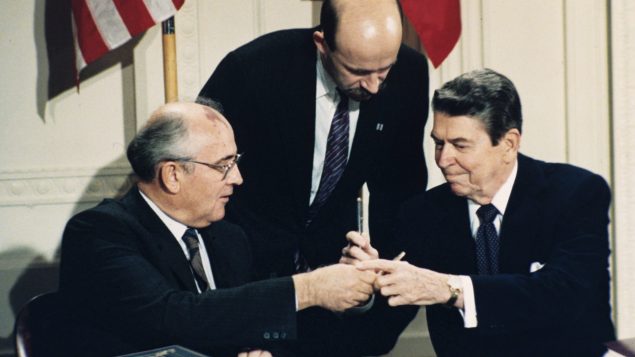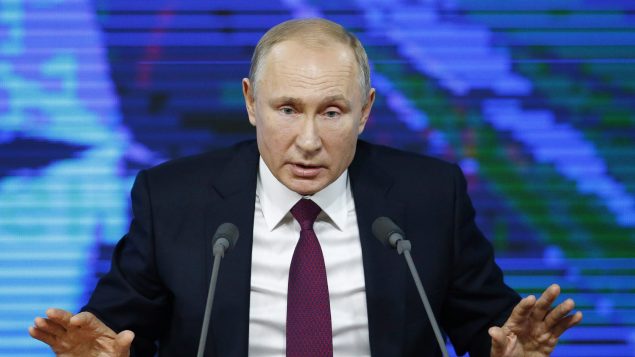As the federal election campaign picks up steam, federal officials should be ready to counter possible Russian disinformation campaigns targeting Canadians, says a Russian expert.
Sergey Sukhankin, a senior fellow with the Jamestown Foundation, a U.S. think-tank, who is teaching at the Concordia University of Edmonton, says Russian and Canadian interests collide in the Arctic, in Ukraine and in the Baltic states, making Canada a likely target for Russian disinformation operations.
“Perceived as one of Russia’s chief adversaries in the Arctic region, Canada is a prime target in the information wars, with Russia potentially even meddling in the October 2019 federal election,” Sukhankin writes in a new University of Calgary study.
“Ottawa should be ready for a new surge in cyberattacks, disinformation and propaganda levelled against Canada in the near future.”
However, Sukhankin said he doesn’t expect the Russian disinformation campaign targeting Canada to be as powerful and far reaching as the Kremlin’s campaigns in Ukraine or the three Baltic states, the United States and the European Union.
Building on Soviet experience

U.S. President Ronald Reagan, right, and Soviet leader Mikhail Gorbachev exchange pens during the Intermediate Range Nuclear Forces Treaty signing ceremony in the White House on Dec. 8, 1987. (Bob Daugherty/AP Photo/ file)
To understand the Kremlin’s 21st century disinformation campaigns, one has to look back to the campaigns waged by the Soviet Union, Sukhankin said in an interview with Radio Canada International.
“In many ways Russia’s current disinformation campaign against Western countries, including Canada, of course, derives its origins from the Soviet period,” Sukhankin said.
(click to listen to the full interview with Sergey Sukhankin)
ListenThe Soviets used a number of tools that included disinformation, fake stories, release of the kompromat (compromising materials), and a host of other measures, Sukhankin said.
“What is totally different today, what differs Russian disinformation from the Soviet one is that Russia has been able to get rid of this ideological surcharge, which has made Russian propaganda much more flexible and appealing to various sides of respective societies where Russia tries to channel its disinformation,” he said.
“This at the same time makes Russian disinformation much more dangerous and a much more far-reaching phenomenon than it used to be before 1991.”
Canada is seen by the Kremlin as one of the most russophobic countries, Sukhankin said.
“This is quite explicitly visible in various reports, various papers that are issued by Russia’s pro-Kremlin information outlets such as RT, Sputnik, that portray Canada as Russia’s – I wouldn’t say archenemy – but a country that has been progressively anti-Russian and russophobic since at least 2014,” Sukhankin said.
In the eyes of the Kremlin, Ottawa’s full and unconditional support for Ukraine following Russia’s annexation of Crimea has transformed Canada from an ordinary Western adversary into a country that is part of the vanguard of anti-Russian forces in the West, Sukhankin said.
Waging information warfare at home and abroad

Russian President Vladimir speaks during his annual news conference in Moscow, Russia, Thursday, Dec. 20, 2018. (Alexander Zemlianichenko/AP Photo)
It’s very important to distinguish critical reporting of Western policies and actions in the Russian media from outright disinformation, but often there is only a faint line separating the two, Sukhankin added.
“What Russian disinformation is it usually has a piece of truth, a tiny, tiny piece of truth at its kernel,” Sukhankin said. “And then this piece of truth gets layered with several layers of facts that are either misconstrued deliberately or unintentionally and the final product that the audience receives is a peculiar combination is something that is party true but at the end of the day this is something that does not reflect things as they are in reality.”
The Kremlin disinformation machine has two main target audiences, Sukhankin said.
First and foremost, the Kremlin disinformation machine is directed at the Russian domestic audience, he said.
This internal disinformation campaign uses rather crude and not terribly sophisticated methods, Sukhankin said.
But the disinformation campaigns directed at Western audiences are rather different, he added.
“The first layer, the most primitive layer is the so-called trolls and those people who disseminate fake news,” Sukhankin said. “Later this information is picked up by Russia’s major news outlets and then subsequently by Western large outlets and the final product is totally different from reality.”
‘Crucified boy’

A woman stands inside an apartment of a residential building, which locals said was damaged during a recent shelling, in the suburb of the rebel-controlled city of Donetsk, Ukraine June 28, 2019. (Alexander Ermochenko /REUTERS)
One of the most famous examples of such fake stories was the case of the “Crucified Boy.” In July 2014, at the height of the fighting in the Donbas region of eastern Ukraine between government forces and pro-Russian rebels, Russia’s state-owned Channel One TV station reported that a three-year-old boy was publicly crucified by Ukrainian forces in the city of Sloviansk.
However, investigative reporters from independent Russian news outlets were unable to find any traces of the boy or his family and eventually proved that the story was simply made up by the rebels to paint the Ukrainian government forces as neo-Nazi henchmen.
Channel One was eventually forced to admit that the story was “inaccurate,” Sukhankin said, but the broader public never heard the correction and many people in Russia still believe the story to be true.
Canada in the cross-hair

Foreign Affairs Minister Chrystia Freeland speaks at a press conference at the conclusion of the Ukraine Reform Conference ministerial at the University of Toronto on July 2, 2019. Russian media have reported on the fact that Freeland’s maternal grandfather was a Ukrainian nationalist intellectual who had collaborated with the Nazis during WWII. It was seen as an effort to discredit Freeland and her policies in support of Ukraine. (Levon Sevunts/RCI)
The Russian disinformation machine has also targeted Canada, he added.
One of the attacks was directed at Foreign Affairs Minister Chrystia Freeland, whose maternal grandfather was a Ukrainian intellectual who had collaborated with the Nazis during the Second World War by editing a nationalist newspaper published in the German-occupied Polish city of Krakow.
Media reports portrayed Freeland as an ardent supporter of the ultranationalist ideology espoused by her grandfather and other Ukrainian nationalists during WWII, Sukhankin said.
“This meant to demonstrate to Russian domestic audiences that Ukraine is being supported by the West and neo-Nazi forces in the West,” Sukhankin said.
The Russian disinformation campaign has also targeted Canadian and NATO forces in the Baltic states, said Sukhankin.
“They are being portrayed as a bunch of immoral, drunk, absolutely inept soldiers, who will never protect those countries but would rather act as colonial forces,” Sukhankin said.







For reasons beyond our control, and for an undetermined period of time, our comment section is now closed. However, our social networks remain open to your contributions.